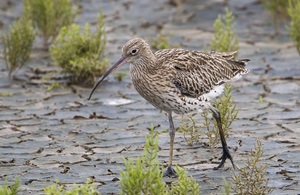Wildlife protection plan to unlock Hampshire housebuilding
Trailblazing new government-backed scheme to benefit both people and wildlife in the Solent.

Credit: Natural England.
Defra has today (11 September) announced £3.9 million to unlock housing growth in south Hampshire in a scheme that will reduce harmful nitrates and aid wildlife recovery.
Housing growth has stalled in the Solent area for over a year due to concerns that nitrates were causing a range of negative environmental effects. These include excessive growth of green algae which smothers and damages rare habitats and wildlife, including the Solent’s internationally protected estuaries, salt marshes and seagrass beds, as well as protected birds including curlews.
The government will invest £3.9 million in the first-of-its-kind project to set up an online ‘nitrate trading’ auction platform. Through this, housing developers will buy credits to create new habitats such as meadows, woodlands and wetlands - which will prevent harmful levels of nitrates from new housing from reaching the Solent’s rare wildlife and habitats. This will also provide more outside spaces as part of government ambitions for a green, nature-based recovery from coronavirus.
Alongside this, a new nature reserve at Warblington Farm – a site covering 60 hectares of new woodlands and wetlands - opened this week, which will be funded through the credits which housing developers purchase. The new farm will help remove nitrates and in turn reduce pollution impacts on the Solent.
Environment Minister Rebecca Pow said:
I am thrilled to announce this funding which uses nature-based solutions to alleviate the housing pressure in the local area. Not only will this innovative scheme unlock thousands of much-needed homes for the local area, but it will provide habitat rich areas for wildlife in a true win-win.
As the nation recovers from coronavirus, it’s more vital than ever that we build back greener, and this project will also help people connect with nature by providing more green spaces for them to enjoy.
Natural England played a key role in providing expert advice for the innovative scheme, including helping to select suitable sites to create new areas for habitat creation.
Natural England Chair Tony Juniper added:
This is a beautiful part of Hampshire, rich with wetlands, coastal inlets and shingle beaches, and it’s no wonder that more people wish to live in the area, creating demand for new homes. More people does, however, mean more nitrogen getting into the environment, and this is causing the growth of green algae ‘mats’ in the Solent, affecting protected habitats and wildlife along the south coast.
This innovative new scheme that Natural England has helped design will not only help nature’s recovery in the area, but also address the historic demand for new housing around the Solent.
It is but one example of how it is possible to find solutions to apparently intractable challenges, and to fund them, meaning that we can build more homes while at the same time protect and enhance the rich and varied wildlife of this unique area. It also reveals how it is possible to harness regulation in a positive way, to create incentives for the recovery of the local natural environment, in turn benefiting people living in the area.
The nitrate trading platform pilot will be rolled out over the next two years and delivered jointly with the Ministry for Housing, Communities and Local Government; Natural England; and the Environment Agency.
Housing Minister Christopher Pincher said:
Building the homes the country needs is central to the mission of this government and is an important part of our plans to recover from the impact of the coronavirus.
This innovative project will deliver new homes while protecting and enhancing our natural environment for today, and for future generations.
Defra is also currently in discussions with the Hampshire and Isle of Wight Wildlife Trust about a potential loan to purchase further land for the scheme.
Debbie Tann, CEO of Hampshire and Isle of Wight Wildlife Trust, said:
Nitrate pollution in the Solent wreaks havoc with our vital marine ecosystems, suffocating the life out of our seas. This is a really critical issue and, until recently, every new house built simply added to the pressure.
Now, thanks to Natural England and Defra, we are taking important steps towards addressing this problem – ensuring that houses can only be built if the nitrate impact is properly addressed. We are delighted that government is supporting our nature-based solution and this funding will enable us to create wonderful new nature reserves for wildlife at the same time as helping to clean up our environment.
If the pilot is successful, it could be extended and rolled out to a number of other areas, providing a vital wider application to other parts of England. This will also inform the government’s wider work on market-based solutions to environmental issues – such as carbon offsetting, biodiversity net gain, water quality and flood risk management.
The announcement builds on the Environment Secretary’s recent speech where he set out a £5m pilot to establish a new Natural Capital and Ecosystem Assessment. This will improve the baseline understanding of habitats and species abundance across the country in every planning authority, in order to make the best decisions towards achieving the government’s vision to leave the environment in a better state than we found it. This will better protect species and habitats and ensure that new developments really do mean net gain for people and for nature.
Today’s move also builds on the government’s landmark Environment Bill which will tackle the biggest environmental priorities of our time, including introducing biodiversity net gain, which will ensure that the new houses we build are delivered in a way which protects and enhances nature.